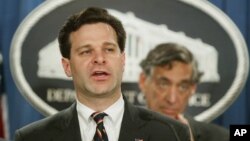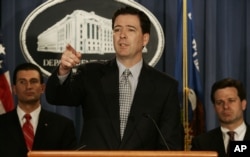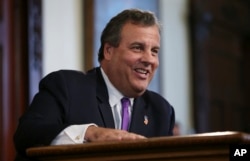President Donald Trump's choice to replace ousted FBI Director James Comey is a former federal prosecutor who switched to defending powerful clients like New Jersey Gov. Chris Christie, whom he once counted as a Justice Department colleague.
While Christopher Wray earned high marks from past associates for his national security experience and legal acumen, he’s likely to face tough questions about his independence given the circumstances surrounding Comey's dismissal, which came after a series of fraught conversations he had with Trump about the FBI probe into his campaign’s ties to Russia.
The White House had initially pinned Comey's May 9 firing largely on his handling of the 2016 Clinton private email server investigation, but Trump later said he had the Russia probe in mind when he decided to dismiss the FBI director.
Trump announced his intention to choose Wray in a tweet Wednesday morning, calling him "a man of impeccable credentials." The Justice Department later released an endorsement of the nomination by several former department officials.
Richard Blumenthal, a Democrat on the Senate Judiciary Committee, praised Wray for his "solid credentials." He tweeted that the "job will require independence and guts to stand up to political interference."
Retired FBI agent David Gomez said the timing of the announcement was clearly meant to "deflect attention from Comey's testimony," but added: "I don't think it's a bad choice or political choice."
Early years
Wray, 50, has had a distinguished career as a federal prosecutor and private lawyer. After graduating from Yale University and Yale Law School in 1992, he returned to his native Atlanta to briefly work for the King & Spalding law firm, before spending eight years as a federal prosecutor in the city and later as a senior Justice Department official in Washington.
In 2003, former President George W. Bush tapped him as assistant attorney general in charge of the Criminal Division, a position that brought him under Comey, then the Department's No. 2 official, and above Christie, then U.S. Attorney for the state of New Jersey. While leading the division, Wray oversaw the federal investigation into the collapse of energy giant Enron Corporation and other fraud cases.
With jurisdiction over counterterrorism and counter-intelligence matters, working in the division gave Wray extensive national security experience, said Alice Fisher, who succeeded Wray as assistant attorney general for the Criminal Division and was under consideration for the FBI director's job.
"Even before that, in his other role in the department and in the deputy attorney general's office, Chris was right there on 9/11 with many of us, working on national security every day for weeks and months on end," said Fisher, now a partner at Latham & Watkins.
But working in the Justice Department in the wake of the attacks of 9/11 also put Wray in the position of defending controversial Bush administration policies, including the Patriot Act's provision on providing material support for terrorism, which was roundly criticized by rights organizations.
Wray's support for Bush policies had its limits. In 2004, he came to the support of Comey after Comey threatened to resign over his refusal to approve parts of a controversial domestic wiretapping program, according to a 2013 Washingtonian report.
Back to beginning
The two officials left the Justice Department for private practice around the same time in 2005, with Wray returning to King & Spalding as the law firm was embarking on an international expansion that led to the opening of offices in more than 17 countries, including Russia and the United Arab Emirates.
While King & Spalding's bio of Wray credits him with representing large corporations under federal investigation, Wray's representation of Christie, the Republican governor of New Jersey, during the so-called Bridgegate investigation stands out as a high-profile political case likely to draw renewed scrutiny.
Christie was never charged in the case, but last year two of his former associates were sentenced to prison. Randy Mastro, a partner at Gibson Dunn who represented the governor's office during the investigation, said Wray "distinguished himself in the representation."
"He knows the bureau, he knows the Department of Justice, he has all the attributes of professionalism, personal integrity and honor that one would want to see in an FBI director," Mastro said.
Wray's current party affiliation is unknown, but in 2001 he was registered as a Republican in Maryland and he's contributed almost exclusively to Republican candidates.
In December, he joined a group of other former assistant attorneys general to endorse Trump's nomination of Jeff Sessions as attorney general.
Wray is not the first King & Spalding partner to be picked by Trump for a senior position. In April, Trump appointed Gilbert Kaplan to head the Department of Commerce's International Trade Administration. Another partner, Stephen Vaughn, serves as the general counsel to the Office of the U.S. Trade Representative.
The firm’s employees and partners gave $537,378 in campaign donations to national political candidates during the 2016 election cycle, including $87,967 to Clinton and $3,200 to Trump, according to the Center for Responsive Politics.
Lynn Davis contributed to this report.






